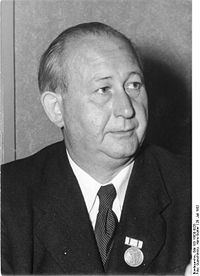
Max Fechner
Encyclopedia

German Democratic Republic
The German Democratic Republic , informally called East Germany by West Germany and other countries, was a socialist state established in 1949 in the Soviet zone of occupied Germany, including East Berlin of the Allied-occupied capital city...
.
Fechner was a trained tool maker. He joined the SPD
Social Democratic Party of Germany
The Social Democratic Party of Germany is a social-democratic political party in Germany...
in 1910, was a member of the USPD
Independent Social Democratic Party of Germany
The Independent Social Democratic Party of Germany was a short-lived political party in Germany during the Second Reich and the Weimar Republic. The organization was established in 1917 as the result of a split of left wing members of the Social Democratic Party of Germany...
from 1917 to 1922, and then returned to the SPD. He was a district councilor for the Neukölln
Neukölln
Neukölln is the eighth borough of Berlin, located in the southeastern part of the city and was part of the former American sector under the Four-Power occupation of the city...
district of Berlin from 1921 to 1925, and member of the Landtag
Landtag
A Landtag is a representative assembly or parliament in German-speaking countries with some legislative authority.- Name :...
of Prussia from 1924 to 1933. He worked in the National Executive of the SPD and was the editor of the municipal policy magazine Die Gemeinde (The Community).
Fechner participated in the social-democratic resistance group led by Franz Künstler, and was jailed in 1933-1934 and 1944-1945 by the nazi regime.
After the war, Fechner became a member of the SED
Socialist Unity Party of Germany
The Socialist Unity Party of Germany was the governing party of the German Democratic Republic from its formation on 7 October 1949 until the elections of March 1990. The SED was a communist political party with a Marxist-Leninist ideology...
, he was elected to its Executive Committee and Central Committee. Between 1946-1948, he was a city councilor for East Berlin
East Berlin
East Berlin was the name given to the eastern part of Berlin between 1949 and 1990. It consisted of the Soviet sector of Berlin that was established in 1945. The American, British and French sectors became West Berlin, a part strongly associated with West Germany but a free city...
, he was elected in 1949 to the German People's Council, in 1950 to the People's Chamber.
In 1948, Fechner succeeded Eugen Schiffer
Eugen Schiffer
Eugen Schiffer , was the German Minister of Finances and Vice-Chancellor from 13 February to 19 April 1919 and 3 October 1919 to 27 March 1920. From 1919 to 1920 and again in 1921 he served as Minister of Justice....
as President of the German Central Administration of Justice, he served from 1949 to 1951 as President of the Association of Democratic Lawyers, and was from October 1949 to July 1953 Minister of Justice of the newly created GDR.
In an interview to Neues Deutschland
Neues Deutschland
Neues Deutschland is a national German daily newspaper. It was the official party newspaper of the Socialist Unity Party of Germany , which governed the German Democratic Republic , and as such served as one of the party's most important organs...
, the official party newspaper of East Germany, on 30 June 1953, he voiced his opposition to the prosecution of workers who had taken part in the 17 June strike
Uprising of 1953 in East Germany
The Uprising of 1953 in East Germany started with a strike by East Berlin construction workers on June 16. It turned into a widespread anti-Stalinist uprising against the German Democratic Republic government the next day....
. Consequently, he was denounced as an enemy of the state and the party, lost his ministerial charge, was excluded from the SED and arrested. After a two-year long detention without charge in the Stasi
Stasi
The Ministry for State Security The Ministry for State Security The Ministry for State Security (German: Ministerium für Staatssicherheit (MfS), commonly known as the Stasi (abbreviation , literally State Security), was the official state security service of East Germany. The MfS was headquartered...
headquarters at Hohenschönhausen
Hohenschönhausen
Hohenschönhausen was a borough of Berlin, that existed from 1985 until Berlin's 2001 administrative reform. It was composed by the localities of Alt-Hohenschönhausen , Neu-Hohenschönhausen, Malchow, Wartenberg and Falkenberg.-Overview:...
, he was sentenced to eight years of prison by the Supreme Court
Supreme Court of East Germany
The Supreme Court of the German Democratic Republic was the highest judicial organ of the GDR. It was set up in 1949 and was housed on Scharnhorststraße 6 in Berlin. The building now houses the district court in Berlin, Germany 2 Instance and the District Court Berlin-Mitte...
. He was however released on 24 June 1956, and two days later amnestied. In June 1958, he was reinstated as a SED member.
Fechner received in 1967 the Patriotic Order of Merit, and in 1972 the Karl Marx Order.
Publications
- How could it happen?, Berlin, 1945.
- The nature and role of the new democratic self-government, Berlin, 1948.

